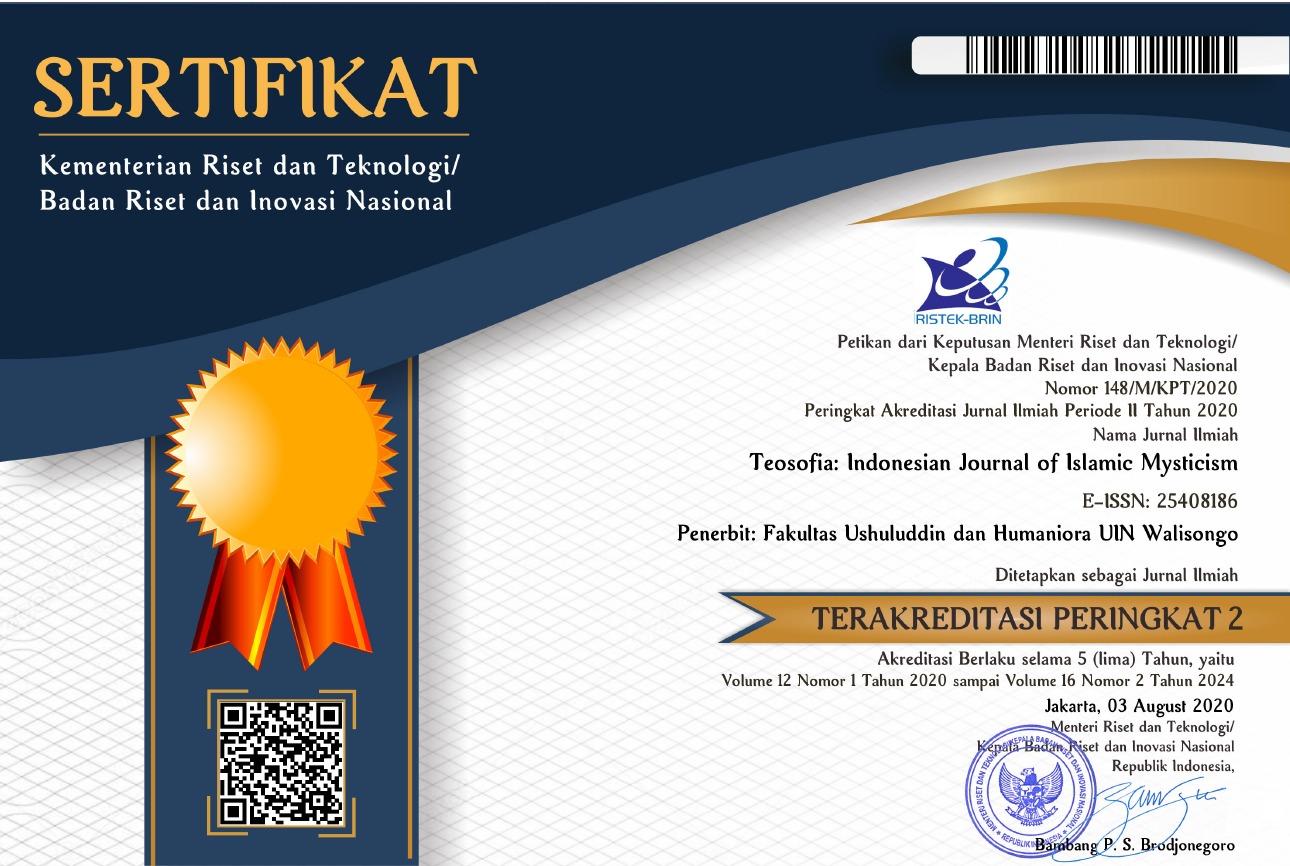Ṣadaqa and ‘Spirituality Gene’ Expression: The Qurʾan and Advances in Epigenetics
DOI:
https://doi.org/10.21580/tos.v10i1.8656Keywords:
Ṣadaqa, interpretation, Qur'anic exegesis, epigenetics, gene expressionAbstract
Charity (ṣadaqa) is commonly given for religious reasons: Muslims donate voluntarily to earn Allah’s pleasure and receive His blessings. However, there have been changes in the way Muslims perceive charity and what significance it has in their life. Many studies have addressed this issue but failed to explore the connection between ṣadaqaand mental state. This paper was aimed to complement the existing studies by analyzing the process of the shifting interpretation of charity and its positive effects on the donors. This study used qualitative analysis of primary and secondary data. The data was processed through descriptive methods and content analysis. In particular, it focused on analyzing the religious background of the donors, including the biological processes underlying their tendency to give generously. The study concluded that the practice of giving ṣadaqa increases social, emotional, and spiritual wellbeing, depending on the level of spirituality of the donors and their intention.Downloads
References
Abd Jalil, Mohamad Isa. “Giving in an Islamic Perspective.” Miqat: Jurnal Ilmu-Ilmu Keislaman 44, no. 1 (2020): 1. https://doi.org/10.30821/miqot.v44i1.696.
Al-Bantani, Muhammad Nawawi. Nasaih Al-’Ibad. n.c: Galeri Kitab Kuning, n.d.
Al-Jurjani, Ali bin Muhammad bin ’Ali al-Zain. Kitab Al-Ta’rifat. 1st ed. Beirut: Dar al-Kutub al-Ilmiyyah, 1983.
Al-Nafazi, Ibnu ’Ibad, and ’Abdullah Al-Syarqawi. Syarh Al Hikam. Beirut: Dar al-Kutb al-Ilmiyah al-Haramain, n.d.
Al-Zuhaili, Wahbah. Al-Fiqh Al-Islami Wa Adillatuh. II. Damaskus: Dar al-Fikr, 1985.
Ali, Abdullah Yusuf. The Holy Qur’an: Text, Translation Anf Commentary. Lahore, Pakistan, Kashmir, iBazar: Ashraf Printing Pres, 1980.
Anderson, M.R., Miller, L, Wickramaratne, P., Svob, C., Odgerel, Z., Zhao R., and Weissman, M.M. “GeneticCorrelate of Spirituality Religion and Depression: A Study in Offspring and Grandchildren at High and Low Familial Risk for Depression.” Spirituality in Clinical Practice 4(1) (2017): 43–63. https://doi.org/http://dx.doi.org/10.1037/scp0000125.
Asadi S, Gholizadeh Z, Jamali M, Nazizadeh A, Habibi. “VMTA2 Gene Molecular Study Religious Behavior and Belief in God of the Citizens of the City of Tabriz in Iran.” SOJ Genit Sci 3(1) (2016): 1–6.
Baqutayan, Shadiya Mohamed S, Magda Ismail A Mohsin, Akbariah Mohd Mahdzir, and Aini Suzana Ariffin. “The Psychology of Giving Behavior in Islam.” Sociology International Journal 2, no. 2 (2018): 88–92. https://doi.org/DOI: 10.15406/sij.2018.02.00037.
Barraza, JA, McCullough, ME, Ahmadi, S, Zak, SP. “Oxytocin Infusion Increases Charitable Donations Regardless of Monetary.” Hormones and Behavior 60 (2011): 148–51. https://doi.org/doi:10.1016/j.yhbeh.
Biyanto, Biyanto. “Berdamai Dengan Pluralitas Paham Keberagamaan.” Teosofi 5, no.1 (2015): 164–89. https://doi.org/https://doi.org/10.15642/teosofi.20155.1.164-189.
Darwin, C. On the Origin of Species by Means of Natural Selection, or the Preservation of Favoured Races in the Struggle for Life. London: John Murray, 1859.
Davis, J. J. J. “The Brain of Melchizedek: A Cognitive Neuroscience Approach to Spirituality - Appendix C - A Brief Introduction to the Neuro-Genetics of Spirituality”,” 2009.
Dispenza, J. Becoming Supernatural: How Common People Are Doing the Uncommon. Hay House, Inc, 2017.
Hujjaj, Muslim bin. Sahih Muslim. Beirut: Dar Ihya al Turas al- ’Arabi, n.d.
IJzendoorn, MH, Huffmeijer, R, Alink, LRA, Bakermans-Kranenburg, MJ, and Tops, M. Van. “The Impact of Oxytocin Administration on Charitable Donating Is Moderated by Experiences of Parental Love-Withdrawal.” Frontiers in Psychology 2, no. 258 (2011). https://doi.org/DOI: 10.3389/fpsyg.2011.00258.
Jr, Orley M. Amos. “Empirical Analysis of Motives Underlying Individual Contributions to Charity.” Atlantic Economic Journal 10 (1982): 45–52. https://link.springer.com/article/10.1007/BF02300194.
Lipto, BH. The Biology of Belief: Unleashing the Power of Consciousness, Matter, and Miracles. . ReadHowYouWant.com, 2010.
Mohammad Abdul Gofur, Desi Erawati. “Faktor Pendorong Sedekah Dan Upaya Maintaning Sedekah Pada Lembaga Sosial.” Dialogia: Jurnal Studi Islam Dan Sosial 18, no.2 (2020): 377–94. https://doi.org/DOI: https://doi.org/10.21154/dialogia.v18i2.2040.
Price TD, Qvarnström A, Irwin DE. “The Role of Phenotypic Plasticity in Driving Genetic Evolution.” In Proceedings Biological Sciences. 270 (1523), 2003. https://doi.org/DOI:10.1098/rspb.2003.2372. PMC 1691402. PMID 12965006.
Schlegelmilch, Bodo B; Adamantios; Diamantopoulos, and Alix Love. “Characteristics Affecting Charitable Donations: Empirical Evidence from Britain.” Journal of Marketing Practice: Applied Marketing Science 3 (1997): 14-28(15). https://doi.org/https://doi.org/10.1108/EUM0000000004318.
Sina, Husen bin Abdullah Ibnu. Al-Isya>ra>t Wa Al-Tanbi>ha>t. 2nd ed. Al-Nasyr al Balaghah, 1383.
Sojka, Jane R. Ziedler. “Understanding Donor Behavior: A ClassificationParadigm".” In In NA - Advances in Consumer Research, 13:240–45, 1985.
Teah, Min, and Michael Lwin. “Moderating Role of Religious Beliefs on Attitudes towards Charities and Motivation to Donate.” Asia Pacific Journal of Marketing and Logistics, Issac Cheah 26(5) (2014): 738–60. https://doi.org/10.1108/APJML-09-2014-041.
Zak, P.J. “The Physiology of Moral Sentiments.” J. Econ. Behav. Organ 77 (2011): 53–65.
Downloads
Published
How to Cite
Issue
Section
License
Copyright
The copyright of the received article shall be assigned to the journal as the publisher of the journal. The intended copyright includes the right to publish the article in various forms (including reprints). The journal maintains the publishing rights to the published articles. Therefore, the author must submit a statement of the Copyright Transfer Agreement.*)
Licensing

This work is licensed under a Creative Commons Attribution-ShareAlike 4.0 International License.
In line with the license, authors are allowed to share and adapt the material. In addition, the material must be given appropriate credit, provided with a link to the license, and indicated if changes were made. If authors remix, transform or build upon the material, authors must distribute their contributions under the same license as the original.
_______
*) Authors whose articles are accepted for publication will receive confirmation via email and send a Copyright Transfer Agreement.








